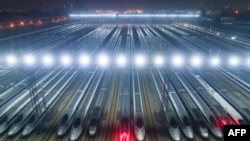China Railway will raise the fares of four high-speed rail routes by 20% to 40% on June 15, despite the lines being profitable.
According to "Sina Finance," China Railway Group's financial data for 2023 shows that the company's net profit turned from negative to positive, reaching RMB 3.304 billion, or $456.8 million, and its operating performance was the best in history.
The price hike announcement May 2 cited "operating costs such as line maintenance, vehicle purchase, equipment updates, and labor” for the rate increases.
It said affected routes include the Beijing-Guangzhou High-speed Railway's Wuguang Section and the Shanghai-Kunming High-speed Railway's Hangzhou-Changchun Section.
Some analysts believe the price increase is due to central and local governments being short of money as China’s real estate-fueled economy has weakened.
Wang Kuo-chen, an assistant researcher at the Chung-Hua Institution for Economic Research in Taipei, tells VOA last year's impressive performance is only "profit after deducting operating costs," not counting the debt caused by construction investment.
He says the increase in ticket prices can cover only general income but will not help the deficit in fixed asset investment. Fixed assets must be filled by real estate. Unfortunately, China's housing market is sluggish and cannot be used to support high-speed rail.
Wang said, "Xi Jinping has ordered that unnecessary high-speed rails be stopped. If high-speed rails are unfinished, won't housing prices fall further? It will become a vicious cycle."
Chinese news outlet The Paper reported on July 20, 2023, that due to the railway sector's serious losses, more than 20 high-speed rail stations in various places have been completed but have not been used or have been decommissioned.
The price increase has been criticized on social media platforms such as Douyin and Weibo.
One commenter wrote, "Wealth has nothing to do with me, but I have to share all the suffering."
The South China Morning Post reports China's public sector is under pressure to raise prices for some services, including train tickets and utilities, amid tight local finances and a prolonged period of deflationary risks.
A Shanghai resident who for privacy reasons only gave her surname Ms. Shi, takes the high-speed train to and from Hangzhou for work every week. She tells VOA that white-collar workers like herself who commute weekly can afford the high-speed rail.
She notes that most passengers who take the high-speed rail daily are business travelers who are reimbursed by companies or government agencies for the cost.
"The price increase in basic expenditures for people's livelihood, such as water and electricity, is universal and undifferentiated,” she says. “No matter your class, you would feel it, but high-speed rail is a high-(class) consumption behavior.”
Lynn Ling, a writer who migrated to Taiwan from Chengdu, says the price increase of high-speed rail undoubtedly adds insult to injury when many people's wages have dropped but their daily necessities have become more expensive.
She tells VOA that China's high-speed rail and real estate economies are closely integrated as most high-speed rail stations are located in suburbs far away from the city, where new shopping malls and residential areas are planned, hoping that high-speed rail will generate business for those areas.
But with the collapse of China's real estate economy, the vacancy rate of new buildings and shops located near high-speed railway stations is high, says Ling, noting the assertion "high-speed rail drives business" is an illusion.
"When China encountered this economic downturn, it (the Chinese government) used high-speed rail to support and stimulate domestic demand and the local economy. Like after the economic crisis in 2008 and the economic downturn in 2012, and especially after this three-year pandemic, high-speed rail has been overinvested. (The Chinese government) is fully aware of it, but there is no other way, and it does not have other core technologies."
As for the Shanghai commuter, Ms. Shi, she believes that although infrastructure debt is high, high-speed rail will bring business, commuting convenience and rapid development to economic regions such as the Yangtze River Delta and the Pearl River Delta.
She notes it remains to be seen whether the benefits outweigh the costs.
Adrianna Zhang contributed to this report.
